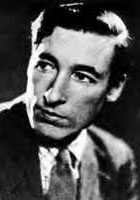Carrickfergus Poem by Louis Macneice
Carrickfergus
I was born in Belfast between the mountain and the gantries
To the hooting of lost sirens and the clang of trams:
Thence to Smoky Carrick in County Antrim
Where the bottle-neck harbour collects the mud which jams
The little boats beneath the Norman castle,
The pier shining with lumps of crystal salt;
The Scotch Quarter was a line of residential houses
But the Irish Quarter was a slum for the blind and halt.
The brook ran yellow from the factory stinking of chlorine,
The yarn-milled called its funeral cry at noon;
Our lights looked over the Lough to the lights of Bangor
Under the peacock aura of a drowning moon.
The Norman walled this town against the country
To stop his ears to the yelping of his slave
And built a church in the form of a cross but denoting
The List of Christ on the cross, in the angle of the nave.
I was the rector's son, born to the Anglican order,
Banned for ever from the candles of the Irish poor;
The Chichesters knelt in marble at the end of a transept
With ruffs about their necks, their portion sure.
The war came and a huge camp of soldiers
Grew from the ground in sight of our house with long
Dummies hanging from gibbets for bayonet practice
And the sentry's challenge echoing all day long.
I went to school in Dorset, the world of parents
Contracted into a puppet world of sons
Far from the mill girls, the smell of porter, the salt mines
And the soldiers with their guns.
This poem has not been translated into any other language yet.
I would like to translate this poem
In this poem, Macneice reflects on his childhood in Northern Ireland, being in Ireland but not of Ireland. He sets up a number of binary oppositions in the course of the poem, which should make any post-structuralist happy. In the first line he confounds our expectations by substituting 'gantries' for the more obvious sea. So we have the juxtaposition of industry and nature. But the most important binarism is the distinction between the English occupation of Ireland (and their Scottish auxiliaries) and the 'Irish poor'. The national differences are reinforced by the Protestant/Catholic divide and economic inequality (the neat 'Scotch Quarter' versus the Irish 'slum') . As the son of a Church of England minister of Scottish ancestry, Macniece belongs with the occupiers but somehow longs to be accepted by the Irish people - as expressed as 'the mill girls, the smell of porter'. He is also very conscious of the violence and suffering beneath this picturesque setting, including in the less explicit references to 'lost sirens', a 'funeral cry', the Norman conquerors, the Crucifixition, gibbets (echoed by puppets later) , 'salt mines' etc. As with the other British 'Thirties Poets' he is conscious of the gap between his socialist sympathies and his privileged position as an intellectual.
Jack Upland your comment is very good and well thought through. It wasn't long after his death that the social inequalities in N Ir exploded into violence and the so-called Troubles.